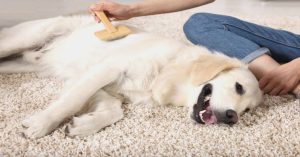Your dog may lick her bed due to various reasons such as seeking comfort, grooming, or marking territory. Licking can provide a soothing sensation, mimic maternal care, or leave their scent to claim ownership.
Additionally, the behavior may indicate underlying issues like allergies, stress, boredom, or obsessive-compulsive disorder. If you notice excessive licking, consult your veterinarian to rule out any medical conditions and provide appropriate treatment or behavioral interventions. Understanding the reasons behind your dog’s bed licking can help you address their needs and enhance their overall well-being.
Insights Into The Psychology Of Dogs
Have you ever wondered why your furry friend likes to lick her bed? Dogs engage in a wide range of behaviors, and licking is one that often leaves pet owners scratching their heads. To understand why dogs lick their beds, we must delve into the fascinating world of canine psychology. For dogs, licking is an instinct and serves various purposes. Understanding the underlying psychology behind this behavior can provide valuable insights into your furry friend’s motivations.
One possible reason your dog licks her bed is that it provides comfort and a sense of security. Licking can be a self-soothing behavior, similar to how some humans may bite their nails or twirl their hair when feeling anxious or stressed. By licking her bed, your dog may be attempting to create a sense of familiarity and calmness in her sleeping environment. Another aspect of canine psychology that explains bed licking is the bond dogs develop with their owners. Dogs are highly social animals who rely on their pack for safety and security. By licking their beds, dogs may be transferring their scent onto it, creating a comforting connection with their owners even in their absence.
Link Between Licking And Instinctual Actions
Licking also has deep roots in a dog’s instinctual behaviors. Dogs have a highly developed sense of smell, and licking is one way for them to explore and gather information about their surroundings. By licking their beds, dogs may be detecting and analyzing various scents, ranging from their own scent to the smells of other household members or even outdoor odors they have brought inside. In addition to scent exploration, licking can also have innate grooming purposes.
In the wild, dogs would use licking as a way to keep themselves clean and free from parasites. Even though our domesticated dogs do not face the same challenges as their wild counterparts, the grooming instinct remains. Licking their beds could be a way for dogs to keep their sleeping area clean and maintain their hygiene. It is important to note that excessive licking can sometimes indicate an underlying health issue or behavioral problem. If you notice your dog excessively licking her bed or showing signs of distress or discomfort during the behavior, it is advisable to consult with a veterinarian or a professional dog trainer for guidance.
Why Dogs Lick Their Beds
When it comes to understanding our furry friends’ behavior, sometimes their actions can leave us puzzled. One common behavior that many dog owners may have noticed is their dog licking their bed. While it may seem strange or even confusing, there are actually several reasons why dogs engage in this behavior.
Exploring The Comfort-seeking Nature
One possible reason why dogs lick their beds is due to their comfort-seeking nature. Dogs have scent receptors in their mouths, and by licking their bed, they are able to pick up familiar smells and scents that provide them with a sense of security. Dogs have a strong sense of smell, and familiar scents can help soothe and calm them, especially when they are feeling anxious or unsure.
Licking As A Pre-sleep Ritual
Dogs are creatures of habit, and many of them have nightly routines before settling down for sleep. Licking their bed may be part of their pre-sleep ritual. Just like humans may engage in certain behaviors to wind down and relax before bed, dogs may find comfort in licking their bed as a way to prepare themselves for sleep. It could be seen as a self-soothing activity that helps them transition into a restful state.
The Need For Cleanliness
In addition to seeking comfort and engaging in pre-sleep rituals, dogs also have an instinctual need for cleanliness. Licking their bed may be their way of ensuring that their sleeping area is clean and free from any unwanted scents or dirt. By licking their bed, they are instinctively removing any potential irritants or debris that could disrupt their sleep or cause discomfort.
Addressing Possible Health Concerns
While licking their bed can be a normal behavior for dogs, excessive or compulsive licking may indicate an underlying health concern. If you notice that your dog is excessively licking their bed or other objects, it may be worth consulting a veterinarian to rule out any medical conditions such as allergies or skin irritations that could be causing discomfort or itchiness.
Conclusion
While it may be puzzling to see your dog licking their bed, it is usually a harmless and natural behavior. Dogs engage in this behavior for various reasons, including seeking comfort, preparing for sleep, and maintaining cleanliness. However, if you notice excessive licking, it is important to monitor your dog and consult a veterinarian if necessary. Understanding your dog’s behavior can help strengthen the bond between you and your furry friend.
Significance Of Scent Marking
Scent marking is a significant behavior in dogs. When your dog licks her bed, she is likely marking her territory and leaving her scent behind as a way to communicate with other dogs. This behavior is instinctual and helps establish boundaries and claim ownership.
Dogs And Their Complex Scent World
One of the most fascinating aspects of a dog’s behavior is their intricate sense of smell. Dogs possess a scenting capability far beyond what humans can comprehend. In fact, they can detect scents up to 100,000 times better than us! This heightened sense of smell allows them to navigate the world in ways we can only imagine, and it also plays a significant role in their communication and social behavior. Unlike humans, dogs have a specialized organ called the vomeronasal organ, also known as Jacobson’s organ. This organ is located in the roof of their mouth and is responsible for detecting pheromones and other chemical signals. Through this exceptional olfactory system, dogs can gather a wealth of information about their environment, other animals, and even their human companions.
Bed-licking As A Territory Claiming Behavior
One intriguing behavior that may puzzle dog owners is the act of licking their beds. While it may seem odd, bed-licking actually serves a purpose in a dog’s scent-marking repertoire. Dogs naturally deposit their scent as a means of communication, and bed-licking is one way they claim their territory and establish a sense of ownership. Bed-licking is a form of scent marking, which is a common behavior seen in many mammals, including dogs. By licking their beds, dogs leave behind their unique scent, which acts as a signal to other dogs and animals that this area is occupied. It’s their way of saying,
This is mine,” and serves as a way to mark their personal space. Just like how dogs mark their territory outdoors by urinating on trees or objects, bed-licking serves a similar purpose indoors. This behavior reassures dogs that they have control over their immediate environment, creating a sense of security and comfort. It may also serve as a way to ward off potential intruders or competitors from encroaching upon their resting spot. Bed-licking is especially common among female dogs, as they naturally have a stronger drive to mark their territory and establish their presence.
It’s important to note that this behavior is not necessarily a sign of anxiety or stress, but rather a natural instinct deeply ingrained within their canine nature. If your dog is regularly licking her bed, there’s no need to be overly concerned. It’s simply their way of asserting their ownership and creating a space that feels uniquely theirs. However, if your dog’s bed-licking becomes excessive or accompanied by other concerning behaviors, it may be worth consulting with a veterinarian or a professional dog behaviorist to ensure there are no underlying health or behavioral issues.
Anxiety And Stress Indicators
If you’ve noticed your dog licking her bed excessively, it could be a sign of anxiety or stress. Pay attention to other indicators such as restlessness or changes in appetite, and consider consulting a veterinarian for guidance.
Understanding Stress Signals In Dogs
Dogs, just like humans, can experience feelings of anxiety and stress. While we may express our stress through certain behaviors, dogs have their own unique way of showing it. Understanding the stress signals in dogs is crucial for us to recognize when they are feeling overwhelmed. By paying attention to their body language and behavior, we can better meet their needs and provide the necessary support. Below, we will explore some common stress indicators that your dog may exhibit.
The Connection Between Anxiety And Licking
One of the ways dogs may display their anxiety or stress is through excessive licking. When your furry friend repeatedly licks her bed, it may be a sign that something is bothering her. Licking can be a self-soothing mechanism for dogs, similar to how some humans may bite their nails or tap their fingers when feeling anxious. By engaging in this repetitive behavior, dogs find a temporary release from their stress. However, it’s important to note that while licking may provide momentary relief, it’s not a healthy long-term coping mechanism.
Recognizing Anxiety And Stress In Your Dog
So, how can you tell if your dog’s licking behavior is related to anxiety and stress? Here are some common indicators to look out for:
- Restlessness or pacing: If your dog can’t seem to relax, constantly moving around or pacing back and forth, it could be a sign of underlying anxiety.
- Panting and drooling: Excessive panting and drooling, especially when there’s no apparent cause like high temperatures or exercise, may be an indication of stress.
- Non-stop barking or whining: Dogs who are feeling anxious can become vocal, barking or whining excessively as a way to express their distress.
- Loss of appetite: Anxiety and stress can also lead to a decrease in appetite. If your dog suddenly loses interest in food, it could be a sign that something is causing her to feel uneasy.
- Shaking or trembling: Just like humans, dogs may tremble or shake when they’re feeling anxious or stressed.
- Avoidance behaviors: Dogs experiencing anxiety often try to retreat from the source of their distress. They may hide, cower, or avoid eye contact with people or other animals.
Helping Your Dog Manage Anxiety And Stress
- Create a calm and safe environment: Establishing a safe and predictable living environment can go a long way in reducing anxiety for your dog. Make sure she has her own quiet space where she can retreat when feeling overwhelmed.
- Exercise and mental stimulation: Regular exercise and mental stimulation are essential for a dog’s well-being. Engage her in activities like walks, playtime, and puzzle toys to help release pent-up energy and reduce stress.
- Behavioral training: Consider enrolling your dog in obedience training or working with a professional trainer to address any behavioral issues that may be contributing to her anxiety.
- Consult with your veterinarian: If your dog’s anxiety persists or becomes severe, it’s important to consult with your veterinarian. They can provide guidance and recommend appropriate interventions, including medications if necessary.
By being aware of the stress signals in dogs and understanding the connection between anxiety and licking, you can better support your furry companion’s emotional well-being. Remember, patience and compassion are key when helping your dog manage anxiety and stress.
Health And Nutrition Factors
If you’re wondering why your dog licks her bed, it could be due to a variety of health and nutrition factors. Licking can be a sign of allergies, stress, or boredom, so it’s important to monitor your dog’s behavior and consult with a veterinarian if necessary.
The Role Of Diet In Excessive Licking
The diet of your dog plays a vital role in controlling its behavior, including excessive licking. A poor diet can contribute to behavioral problems, as well as skin conditions that may lead to increased licking. Some ingredients commonly found in dog food may trigger allergic reactions or sensitivities in certain dogs. These allergens can cause itching, which prompts dogs to lick their bodies or surfaces such as their beds for relief. Therefore, it’s important to evaluate your dog’s diet and identify any potential allergens that could be causing excessive licking. Furthermore, a lack of essential fatty acids in the diet can lead to dry, itchy skin in dogs. As a result, they may resort to licking their beds as a way of soothing their discomfort. Including foods rich in omega-3 and omega-6 fatty acids in your dog’s diet can help improve its skin health and reduce excessive licking behaviors.Summary
- Nutritional deficiencies can contribute to excessive licking in dogs.
- Poor diet quality and improper feeding habits can lead to nutrient deficiencies.
- Allergens in dog food may trigger allergic reactions, leading to increased licking.
- A lack of essential fatty acids in the diet can cause dry, itchy skin, resulting in excessive licking.
Digestive System Considerations
Preparing For Digestion Through Licking
Dogs have a unique way of preparing their bodies for digestion, and licking plays a vital role in this process. When your dog licks her bed, she is engaging in a behavior that stimulates the salivary glands. Saliva contains enzymes that begin the breakdown of food, making it easier for the digestive system to absorb nutrients.The Impact Of Digestion-related Disorders
Digestion-related disorders can have a significant impact on your dog’s licking behavior. For example, if your furry friend is experiencing an upset stomach or indigestion, she may lick her bed excessively as a way to alleviate the discomfort. Similarly, certain conditions like acid reflux or gastrointestinal inflammation can trigger increased licking.Considering The Digestive System’s Role
Understanding the role of the digestive system in your dog’s licking behavior is essential for proper management. If you notice a sudden and excessive licking of her bed, it’s essential to monitor your dog for other signs of digestive distress. These might include changes in appetite, vomiting, or diarrhea. If you suspect a digestive disorder, it’s best to consult with your veterinarian for a proper diagnosis and treatment plan.Behavioral And Environmental Triggers
When it comes to understanding why dogs exhibit certain behaviors, it’s essential to consider both behavioral and environmental factors that contribute to their actions. This is particularly true when it comes to the intriguing behavior of dogs licking their beds. Understanding the behavioral and environmental triggers behind this behavior can provide insight into your furry friend’s needs and help alleviate any potential problems.
Boredom-induced Licking
Dogs, like humans, can get bored. When left alone for extended periods without appropriate mental stimulation or physical exercise, they may resort to self-soothing behaviors such as excessive licking. Boredom-induced licking often manifests as a repetitive and rhythmical motion, where dogs lick their beds as a way to alleviate their restlessness or alleviate anxiety. There are a number of engaging activities and interactive toys available that can help combat boredom and redirect your dog’s attention away from licking their bed. Puzzle toys, treat-dispensing toys, and engaging games like fetch or hide-and-seek can provide the mental exercise and stimulation that dogs need to prevent boredom-induced licking. Additionally, introducing a regular exercise routine that includes walks, runs, or playdates with other dogs can help burn off excess energy and keep your furry friend content and occupied.
Environmental Factors And Their Influences
The environment your dog lives in plays a significant role in their behavior, including licking their bed. Various environmental factors can trigger and exacerbate this behavior. Understanding these influences can help address the underlying causes and provide a more comfortable and suitable environment for your dog. One common environmental trigger for licking is inadequate bedding. It’s essential to provide your dog with a comfortable and appropriate bed material that suits their needs. While dogs may exhibit licking behavior on any bed type, certain materials like fleece or microfiber may be more likely to trigger licking due to their texture.
Experimenting with different bed materials, such as cotton or memory foam, can help alleviate the desire to lick. Another environmental factor to consider is stress or anxiety-inducing situations. Dogs may resort to licking their bed as a way to self-soothe when they feel scared, anxious, or overwhelmed. Identifying and addressing the underlying causes of stress in your dog’s environment can help reduce the need for this behavior. Creating a safe and comfortable space, providing positive reinforcement and rewards, and using calming aids like pheromone diffusers or calming music can all contribute to creating a more peaceful environment for your furry friend. By recognizing and understanding the behavioral and environmental triggers behind why your dog licks her bed, you can take necessary steps to address these issues and provide a more satisfying and comfortable life for your four-legged companion.
Building Comfort And Familiarity
When it comes to our furry companions, we all want them to feel safe and secure in their environment. As dog owners, we may notice some peculiar behaviors, one of which is our dog licking her bed. While it may seem odd, there’s a method to this madness that revolves around building comfort and familiarity. In this article, we’ll explore the role of repetition in feeling secure and how licking helps in creating a familiar space for our furry friends.
The Role Of Repetition In Feeling Secure
Repetition plays a crucial role in our dog’s sense of security. Dogs thrive on routine and predictability, and engaging in repetitive behaviors helps them establish a sense of order and comfort. Licking is one such behavior that provides a soothing and calming effect for dogs. It’s a natural self-soothing mechanism that can help them cope with stress and anxiety. As your dog repeatedly licks her bed, she is not only engaging in a comforting behavior but also reinforcing the familiarity of her surroundings. This repetition helps her establish a sense of routine and consistency, which are important for her overall well-being.
How Licking Helps In Creating A Familiar Space
Licking not only provides comfort but also helps our furry friends create a familiar space. Dogs have a highly developed sense of smell, and licking their bed allows them to distribute their scent, essentially marking their territory. Through this act, they are leaving their unique scent behind, which helps them feel secure and reassured in their environment. This repetitive licking behavior also serves as a form of communication with other dogs, signaling that this particular spot is taken and belongs to them. It creates a sense of ownership and establishes boundaries within their living space, which contributes to their overall sense of security.
In addition to scent-marking, licking also helps dogs stimulate the production of endorphins, the so-called “feel-good” hormones. These endorphins have a calming effect and can alleviate anxiety and stress. By licking her bed, your dog is essentially creating a soothing and familiar space where she can relax and de-stress. It’s important to note that while licking can be a natural and healthy behavior, excessive licking or any sudden change in your dog’s behavior should be addressed with your veterinarian.
Excessive licking can sometimes be a sign of underlying medical issues or anxiety that needs to be addressed. In conclusion, your dog’s inclination to lick her bed may seem peculiar, but it serves a purpose in building comfort and familiarity. Through repetition, licking helps dogs establish a sense of routine and security. Additionally, it allows them to mark their territory and communicate with other dogs. So, the next time you see your furry friend indulging in this behavior, understand that she is creating a safe and familiar space for herself.
Sensory Stimulation And Satisfaction
Dogs, like humans, experience a wide range of emotions and sensations. One common behavior that dogs exhibit is the act of licking. While licking is a natural instinct for dogs, you might be wondering why your furry friend specifically licks her bed. The answer lies in sensory stimulation and satisfaction.
The Pursuit Of Sensory Pleasure
Dogs rely on their senses to navigate and understand the world around them. From sniffing out hidden treasures to exploring with their tongues, a dog’s senses play a crucial role in their daily lives. Licking, in particular, serves as a means for them to explore their environment and interact with objects. When it comes to licking their beds, dogs often engage in this behavior as a way to seek sensory pleasure. By licking their bed, they can experience various textures, tastes, and smells. This act provides them with a satisfying sensory experience and serves as a form of self-soothing.
Bed Texture And Its Relation To Licking Behavior
A dog’s bed texture plays a significant role in their licking behavior. Dogs have unique preferences when it comes to textures, just like humans. While some dogs may prefer soft, plush fabrics, others may enjoy the coolness of a smooth surface. If your dog licks her bed frequently, it could indicate that she enjoys the texture and finds it comforting. Additionally, the act of licking releases endorphins in a dog’s brain, which further enhances their satisfaction and relaxation.
It’s important to note that excessive licking can sometimes indicate underlying health issues or anxiety. If you notice excessive bed licking or any other unusual behavior, it is always best to consult with your veterinarian to rule out any medical concerns. Ensuring your dog has a comfortable bed that appeals to her senses can help promote relaxation and overall well-being. Consider providing a variety of textures and materials to see which ones best satisfy your dog’s sensory needs.
Seeking Attention From Owners
Does your dog lick her bed? Discover the reasons behind this behavior as your dog seeks attention from you, the owner. Understand the possible causes and find ways to address this behavior.
Licking As A Method For Interaction
Dogs have unique ways of communicating with their owners, and licking is one of them. It is not only a way to clean themselves or show affection, but it can also be a way for dogs to seek attention from their owners. When a dog licks her bed, it could be a way for her to communicate that she wants interaction or attention from you. Dogs are highly social animals and they rely on social cues to establish and maintain their bond with their owners. Licking can serve as a method for interaction with their owners.
When a dog licks her bed, she may be trying to get your attention by showing her desire for interaction. The bond between an owner and a dog is built on trust, love, and understanding. Dogs often look to their owners for guidance and reassurance. When a dog licks her bed, it could be an indication that she is seeking attention from you. By licking her bed, she might be trying to communicate that she wants you to engage with her, play with her, or simply spend some quality time together.
The Bond Between Owner And Dog Influence
The bond between an owner and a dog is a strong driving force behind their behaviors and actions. Dogs are highly influenced by the bond they have with their owners, and their actions can be a reflection of their strong attachment to their humans. When a dog licks her bed, it is likely a result of the bond and attachment she feels towards her owner. Dogs see their owners as their pack leaders, and they seek attention and validation from them.
Licking can be a way for dogs to communicate their desire for attention and interaction, as well as their strong bond with their owners. It is important for owners to understand the significance of their bond with their dogs and how it influences their behavior. By recognizing that licking her bed may be a plea for attention, you can better respond to your dog’s needs and strengthen your bond with her.
Redirecting Undesired Licking Patterns
Does your furry friend have a habit of incessantly licking her bed? While it may seem harmless or cute at first, excessive licking can indicate underlying issues or become a nuisance. In this article, we will explore strategies to alter this unwanted behavior and introduce alternative activities to redirect your dog’s attention. By implementing these techniques, you can help your four-legged companion find fulfillment and reduce the excessive licking of her bed.
Strategies To Alter Unwanted Behavior
If your dog has developed a licking habit that extends beyond normal grooming, it’s essential to address the behavior to prevent potential health problems or damage to her bed. Here are some strategies to help change unwanted licking patterns:
- Identify the root cause: Before implementing any corrective measures, it is vital to determine why your dog is excessively licking her bed. Common reasons include anxiety, boredom, allergies, or even an underlying medical condition. Observing your dog’s behavior and consulting with a veterinarian can provide valuable insights into the cause and guide your approach.
- Redirect with positive reinforcement: Once you have identified the underlying cause, redirect your dog’s attention away from her bed by providing positive reinforcement. This can involve offering treats or praise whenever your dog chooses a more desirable behavior or engages in an alternative activity.
- Modify the environment: Make the bed less appealing for licking by using deterrents such as citrus sprays, bitter-tasting substances, or even physical barriers that prevent access. Additionally, providing a comfortable and stimulating alternative resting place can help redirect your dog’s attention away from her bed.
- Establish a consistent routine: Dogs thrive on structure and predictable routines. Establishing a regular feeding, exercise, and playtime schedule can help alleviate boredom and anxiety, which are common triggers for excessive licking.
- Seek professional guidance: If your dog’s licking behavior persists despite your best efforts, consider consulting with a professional dog trainer or behaviorist. They can assess the situation and provide personalized guidance and training strategies to address the unwanted behavior.
Introducing Alternative Activities For Dogs
Redirecting your dog’s attention towards alternative activities can help break the cycle of bed licking and provide mental and physical stimulation. Consider implementing the following activities to keep your pup engaged:
- Interactive toys: Engage your dog with interactive toys that dispense treats or puzzles that require problem-solving. These toys provide mental stimulation while diverting your dog’s attention away from her bed.
- Chew toys: Provide your dog with appropriate chew toys, such as durable rubber or nylon options. Chewing can help relieve stress and anxiety while also preventing destructive chewing on her bed.
- Structured play sessions: Regular play sessions with interactive games like fetch or tug-of-war can keep your dog physically active and mentally stimulated. Playtime is a great opportunity to bond with your pet and redirect her energy onto more desirable activities.
- Training sessions: Engaging in training sessions not only helps improve your dog’s behavior but also provides mental stimulation. Teaching new tricks or reinforcing obedience commands can redirect your dog’s focus and provide a positive outlet for her energy.
- Enrichment activities: Explore various enrichment activities such as hiding treats in puzzle toys, creating scavenger hunts, or setting up scent games. These activities encourage problem-solving and engage your dog’s natural instincts, keeping her occupied and less likely to lick her bed out of boredom.
Frequently Asked Questions
Why Does My Dog Lick Her Bed?
Dogs may lick their beds as a way to mark it with their scent or because they find it comforting and soothing. Licking can also be a sign of boredom or anxiety.
Conclusion
To summarize, understanding why your dog licks her bed is crucial for her well-being and your peace of mind. Whether it’s a habitual behavior, a sign of anxiety, or a health concern, addressing the underlying cause and providing appropriate solutions is essential.
By observing your dog’s behavior, consulting with a veterinarian if necessary, and providing a comfortable and stimulating environment, you can help your furry friend lead a happy and contented life. Remember, a little consideration goes a long way in strengthening the bond between you and your beloved pet.
Related posts:
 What Can I Spray on Dog Bed to Stop Chewing : Effective Solutions Revealed
What Can I Spray on Dog Bed to Stop Chewing : Effective Solutions Revealed
 Why Does My Dog Scratch His Bed : The Hidden Reasons
Why Does My Dog Scratch His Bed : The Hidden Reasons
 Why is My Dog Digging in My Bed : Uncover The Behavior Reasons
Why is My Dog Digging in My Bed : Uncover The Behavior Reasons
 Why Does My Dog Dig on My Bed When Excited ?
Why Does My Dog Dig on My Bed When Excited ?
 Why Does My Dog Pee on His Bed ?
Why Does My Dog Pee on His Bed ?
 Why Does My Dog Chew His Bed at Night
Why Does My Dog Chew His Bed at Night

